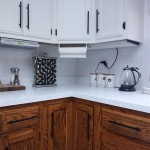Removing Latex Paint from Kitchen Cabinets: A Comprehensive Guide
Updating your kitchen cabinets with a fresh coat of paint can dramatically enhance the overall look and feel of your kitchen. However, if the existing finish is latex paint, removing it can be a daunting task. Latex paint is known for its durability and adhesion, making it challenging to remove without damaging the underlying surface.
Understanding the Chemistry of Latex Paint
Latex paint, also known as water-based paint, is a type of paint that uses water as the solvent instead of oil. When latex paint is applied, the water evaporates, leaving behind a polymer film that forms the paint's protective layer. This film is resistant to moisture and abrasions, which is why latex paint is a popular choice for kitchens and bathrooms.
Preparing for the Removal Process
Before you begin removing latex paint from your kitchen cabinets, it's essential to prepare your workspace and gather the necessary materials. Ensure the room is well-ventilated by opening windows or using a fan. Cover the floor and surrounding surfaces with drop cloths or plastic sheets to protect them from paint chips and chemical fumes.
You will need the following materials:
- Chemical stripper
- Plastic scraper
- Sandpaper or sanding sponge
- Tack cloth
- Mineral spirits
- Clean cloths or sponges
Applying the Chemical Stripper
Chemical strippers are specifically designed to dissolve and remove latex paint. Carefully follow the manufacturer's instructions when applying the stripper. Always wear gloves and eye protection to minimize exposure to chemicals.
Apply a thick layer of the stripper to a small area using a brush or roller. Allow it to sit for the recommended time, as indicated on the product label. The stripper will begin to bubble and soften the paint.
Scraping the Paint
Once the paint has softened, use a plastic scraper to carefully remove it from the surface. Avoid using metal scrapers, as they can damage the underlying wood or metal.
Hold the scraper at a low angle to the surface and gently scrape away the softened paint. Be patient and take your time to avoid gouging or scratching the cabinets.
Sanding and Cleaning
After scraping away the majority of the paint, you may need to sand any remaining residue or imperfections. Use sandpaper or a sanding sponge with a fine grit to smooth the surface.
Wipe down the cabinets with tack cloth to remove any dust or debris. Finally, use a clean cloth or sponge dampened with mineral spirits to remove any residual stripper or paint.
Additional Tips
- Test the stripper on an inconspicuous area before applying it to the entire surface.
- Allow the stripper to work for the full recommended time to ensure maximum effectiveness.
- Use a sharp scraper to avoid tearing the paint film.
- Wear a respirator or face mask when sanding to avoid inhaling dust particles.
- Dispose of used cloths and stripper residues according to local regulations.
Removing latex paint from kitchen cabinets can be a challenging but achievable task with the right preparation and techniques. By following these steps, you can restore your cabinets to their original finish or prepare them for a new coat of paint.

How To Strip Paint Off Kitchen Cabinets And Furniture

An Easier Way To Remove Paint From Wood

How To Paint Cabinets Without Removing Doors House Mix

How To Get Latex Paint Off Wood Cabinets Hometalk

How To Repaint Kitchen Cabinets Painted By Kayla Payne

How To Paint Your Kitchen Cabinets The Prairie Homestead

The Best Way To Paint Kitchen Cabinets No Sanding Palette Muse

An Easier Way To Remove Paint From Wood

How To Paint Cabinets With Latex At Home Ashley

How To Paint Kitchen Cabinets Without Sanding Or Priming
Related Posts








